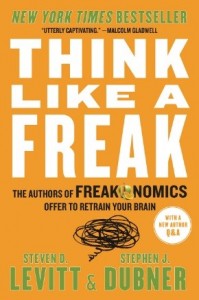The New York Times bestselling book Freakonomics changed the way we see the world, exposing the hidden side of just about everything. Then came SuperFreakonomics, a documentary film, an award-winning podcast, and more.
“Utterly captivating.” - Malcolm Gladwell
“Over nine entertaining chapters [Levitt and Dubner] demonstrate how not to fall into hackneyed approaches to solving problems and concretely illustrate how to reframe questions.” - New York Daily News
“Compelling and fun.” - New York Post
________________________________________________________________________________
With THINK LIKE A FREAK: The Authors of Freakonomics Offer to Retrain Your Brain, Steven D. Levitt and Stephen J. Dubner have written their most revolutionary book yet. With their trademark blend of captivating storytelling and unconventional analysis, they take us inside their thought process and teach us all to think a bit more productively, more creatively, more rationally—to think, that is, like a Freak.
THINK LIKE A FREAK turns what the authors have learned into a set of lessons that anyone can follow, whether your interest lies in minor life-hacks or major global reforms. Readers are taken inside the special thought process behind Freakonomics to reveal a new way of approaching the decisions we make, the plans we create, and the morals that affect our everyday lives. It answers the questions on the minds of everyone who has read the previous books: How can I apply these ideas to my life?
The following is an excerpt from the book:
What sort of signal does a college diploma send to a potential employer? That its holder is willing and able to complete all sorts of drawn-out, convoluted tasks – and, as a new employee, isn’t likely to bolt at the first sign of friction.
So, absent the chance to make every job applicant work as hard as a college applicant, is there some quick, clever, cheap way of weeding out bad employees before they are hired? Zappos has come up with one such trick. Zappos, the online shoe store, has a variety of unorthodox ideas about how a business can be run. Its customer-service reps are central to the firm’s success. So even though the job might pay only $11 an hour, Zappos wants to know that each new employee is fully committed to the company’s ethos. That’s where “The Offer” comes in. When new employees are in the onboarding period – they’ve already been screened, offered a job, and completed a few weeks of training – Zappos offers them a chance to quit. Even better, quitters will be paid for their training time and also get a bonus representing their first month’s salary – roughly $2,000 – just for quitting! All they have to do is go through an exit interview and surrender their eligibility to be rehired at Zappos.
Doesn’t that sound nuts? What kind of company would offer a new employee $2,000 to not work? A clever company. “It’s really putting the employee in the position of ‘Do you care more about the money or do you care more about this culture and the company?’” says Tony Hsieh, the company’s CEO. “And if they care more about the easy money, then we probably aren’t the right fit for them.”
Hsieh figured that any worker who would take the easy $2,000 was the kind of worker who would end up costing Zappos a lot more in the long run. By one industry estimate, it costs an average of roughly $4,000 to replace a single employee, and one recent survey of 2,500 companies found that a single bad hire can cost more than $25,000 in lost productivity, lower morale, and the like. So Zappos decided to pay a measly $2,000 up front to let the bad hires weed themselves out before they took root. As of this writing, fewer than 1 percent of new hires at Zappos accept “The Offer.”
The Zappos weeding mechanism is plainly different from those employed by medieval priests, David Lee Roth, and King Solomon. In this case, Zappos is operating with utter transparency; there is no trick whatsoever. The other cases are all about the trick. It is the trick that makes one party reveal himself, unaware that he is being manipulated. The Zappos story therefore may strike you as more virtuous. But using a trick is – let’s be honest – more fun.
Dubner and Levitt suggest a different way to solve problems by giving readers a totally new way to approach them. Along the way, they share stories of real people who have broken out of the box and tackled problems with innovative techniques, including an unlikely eating competitor from Japan who learned to crush the competition (and eat 50 hot dogs in 12 minutes); the doctor who discovered the cure for ulcers (by infecting himself with bacteria); and a computer scientist who figured out the trick behind e-mail scams (ever get a pesky letter about a Nigerian bank account?), and so many more.
THINK LIKE A FREAK will radically change the way that all of us think about solving any problem.

Connect with the Authors on Facebook.com/Freakonomics and on Twitter @Freakonomics
THINK LIKE A FREAK: The Authors of Freakonomics Offer to Retrain Your
Levitt, Steven D./ Dubner, Stephen J.
$16.99 | William Morrow Paperbacks
On Sale Now
For more information please contact: Paul.Lamb@Harpercollins.com
We’d love to connect with you on Facebook.com/WmMorrowBks and Twitter @WmMorrowBks
